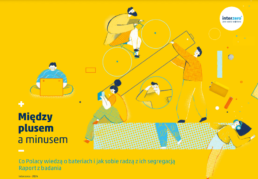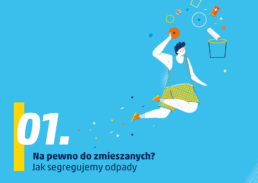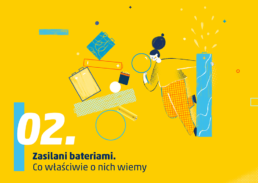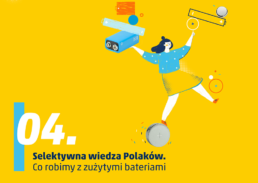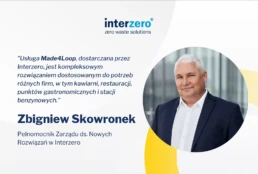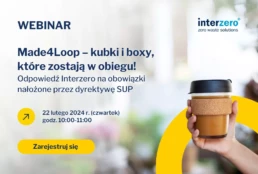New report "Between plus and minus"
New Interzero report "Between plus and minus"
On the occasion of Battery Day, we are publishing a research report as part of the Eco Without Cuts campaign "Between plus and minus - what do Poles know about batteries and how do they deal with their segregation?". The results are surprising. Despite being aware of the obligation to separate waste collection, many of us still fail to comply. Poles perceive batteries as harmful both during production and during storage. They also considered recycling to be dangerous to the environment. Despite many fears about batteries, we do not give much thought to the power source in our devices.
Never before in history have we produced and consumed so many batteries. According to forecasts by McKinsey & Company, their market will grow at 25% per year and, in the case of lithium-ion cells, could reach 30% of annual growth by 2030. This demand is being driven by the development of portable digital technologies, energy banks or electromobility, among other things. With this rapid progress of the battery industry, the question arises about the future of managing this new waste.
In our latest study entitled "Between plus and minus" We asked about Poles' habits regarding separate collection of waste, including hazardous waste. We also wanted to know their motivations and beliefs regarding battery recycling. The fact that a significant proportion of the respondents know how to handle used batteries correctly in their declarations is a positive sign. However, serious doubts arise when it comes to more specific questions. The lack of knowledge regarding the benefits of recycling batteries and concerns about the harmfulness of this process are particularly noteworthy. The fragility of supply chains and the limited deposits of raw materials in the European Union mean that we should treat used batteries and accumulators as a strategic resource. In fact, the lithium, nickel, manganese and graphite present in the cells are of critical importance. Obtaining these elements, regardless of the source, is expensive and risky, and substituting them in technologies at this stage of development seems simply impossible. The importance of recycling in this context is therefore both a measure to protect the environment and to ensure the security of Europe's raw materials.
What is also surprising in the "Between plus and minus" report is the group of young adults who were found to be less inclined towards ecological behaviour than older adults. Respondents under the age of 35 are not only less likely to separate waste, but are also more likely to doubt the sense of recycling. It is the responses of this group that should particularly stimulate reflection on the effectiveness of educational and legislative measures to date.
You can find out more from the press release HERE.
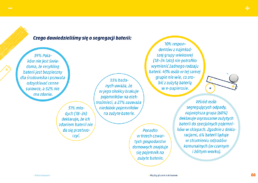
Entrepreneur! Remember about the annual BDO fee!
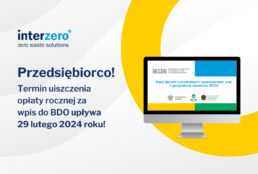
Entrepreneur! Remember about the annual BDO fee!
February 29 is the deadline for paying the annual fee for entry into the BDO in the amount of PLN 100 (micro-entrepreneurs) or PLN 300 (entrepreneurs other than micro-entrepreneurs). The fee should be paid to the account of the marshal's office competent for the company's registered office or place of residence.
Failure to pay the fee will result in removal from the Database on Products, Packaging and Waste Management (BDO) , and the business activity will be subject to a high financial penalty!
Entrepreneurs are subject to registration and annual fees:
- introducing electrical and electronic equipment and authorised representatives,
- introducing batteries or accumulators,
- introducing vehicles,
- producer, importer and intra-Community buyer of packaging,
- introducing products in packaging into the territory of the country,
- introducing tires into the territory of the country,
- introducing lubricating oils into the territory of the country.
Are you looking for support during the reporting period ?
Watch the free Interzero webinar "Everything you need to know about BDO".
More training at a favorable price can be found HERE
How do we perceive...waste? A few words about the project "Closed circuit. Waste in photography".
How do we perceive ... waste? A few words about the project "Closed circuit. Waste in photography".
Waste is substances or objects that people dispose of because they consider them unnecessary, used or hazardous. It can be, for example, food scraps, packaging, used batteries, chemicals or used electronic equipment. The emotions that they arouse in people can be varied and depend on many factors, such as environmental awareness, level of education or culture.
Today we are talking about the inevitable need for transformation and the impact of human activity in the areas of energy, agriculture, production, consumption and waste management. Each of these topics is pressing and our time is becoming increasingly limited.
As environmental educators, we face major challenges. We must not only impart knowledge, but also affect the emotions of our audience. This requires reflection, understanding and taking care of the participants in the educational process. Our work must be effective. Building public awareness is a process in which it is worth experimenting and involving different groups of people and a variety of topics.
As Interzero, representing the business sector, we decided to carry out a project with Museum of Photography in Krakow "Closed Circuit. Waste in Photography". The project envisaged a series of meetings that would result in photographs and texts freely referring to the theme of waste.
We would like to thank Maria Masternak and Anna Sidorska from the Museum of Photography in Krakow, workshop leaders Rafał Siderski and Krzysztof Story, all participants and our Project Manager Monika Krysztofińska.
We are very impressed with the results of this project. We are pleased that the subject of waste, is not only important to us, but also to the wider community, who believe that by acting together, much good can be achieved.
More information about the project can be found in a publication on Eco Without Borders: HERE
Fot. Mateusz Woźniak, Magdalena Niezabitowska Krogulec, Tomasz Orłowski, Marta Wróblewska
Did you know that one of the European countries can benefit 100 per cent? from renewable energy by 2025?

Did you know that one of the European countries can benefit 100 per cent? from renewable energy by 2025?
Since March 2016, no coal-fired power stations have been operating in Scotland. Then the Longannet power station, located north-west of Edinburgh, which had been operating since 1973, was closed. This means that after 115 years, Scotland has stopped generating electricity from burning coal.
Statistics show that the share of renewable energy in Scotland's total electricity consumption was 97.4%. in 2022, while a year earlier it was 90.1%. Scotland owes this result primarily to the development of onshore wind farms, which provided approximately 70%. of green energy in the country. The remaining 30 per cent provided offshore wind farms and hydroelectric power plants.
Scottish Renewables, the renewable energy industry association in Scotland, highlights how much progress has been achieved over the last decade. In 2011, the share of energy from renewable sources in the overall energy balance was only 37%.
The latest data shows that Scotland can benefit from 100%. from renewable energy by 2025 and even start transporting the surplus to other countries.
Plans include the installation and commissioning of a new wind farm of 60 SG 14-222 DD turbines for Moray West, an offshore wind farm owned by Ocean Winds, located off the coast of north-east Scotland in 2024. Each turbine will have an individual power of 14.7 MW; At the moment, it is the most powerful wind turbine ever created. Currently, Scotland is close to achieving the goal of full use of energy from renewable sources in the national electricity sector, and by 2030 the Scottish authorities plan to achieve a 50% share of renewable energy in the total consumption of electricity, heat and transport. The long-term goal is to achieve almost complete decarbonisation by 2050.
Made4Loop - the answer to the new SUP responsibilities
Made4Loop - the answer to the new SUP responsibilities
Although the era of free disposable cups is slowly coming to an end, the changes do not have to mean a chaotic revolution in the company.
From July 1, 2024, entrepreneurs selling drinks in disposable cups will have to provide their customers with alternative packaging that will be more environmentally friendly. This change aims to reduce the amount of plastic waste and is one of the most controversial legislative moves regarding environmental protection in recent years. Although for many it may seem like just another legal and office formality, business owners may lose sleep because it means the need to take decisive action and look for effective solutions.
Therefore, entrepreneurs may consider introducing reusable packaging or packaging made of other materials, including oxo-degradable plastics. Alternatively, they may decide to introduce a deposit system for reusable packaging, which would allow them to be returned and reused.
That is why the Interzero service was created, based on a deposit system for reusable packaging. The Made4Loop model involves the use of reusable cups and packaging, which customers rent for a deposit and then return via a deposit system. In this way, the packaging remains in a closed loop and is reused dozens, if not hundreds of times.
You can find out more in the press release HERE
We would like to remind you that on February 22 there will be a webinar during which Zbigniew Skowronek himself will talk more about the Made4Loop service from Interzero. Registration at the link HERE
Take part in the Made4Loop training - mugs and boxes that stay in circulation! Interzero's response to the obligations imposed by the SUP directive
Take part in the Made4Loop training - mugs and boxes that stay in circulation! Interzero's response to the obligations imposed by the SUP directive
We would like to invite you to a webinar entitled "The world's most important events". "Made4Loop - cups and boxes that stay in circulation! Interzero's response to the obligations imposed by the SUP directive"which will already take place 22 February 2024 (Thursday).
The online training will be led by: Zbigniew Skowronek, Board Agent for New Solutions at the Interzero
Scope of the webinar:
- New obligations for businesses under the SUP Directive,
- Consumer charge for cups and boxes,
- Obligation to provide alternatives to single-use packaging from 1 July 2024,
- What is looping? Definition, target groups,
- Made4Loop
More details and the registration page can be found at HERE
Registration for the webinar runs until: 22 February 2024 at 8:00 am.
You are welcome!
Interzero among the winners of Forbes Monthly Diamonds 2024!
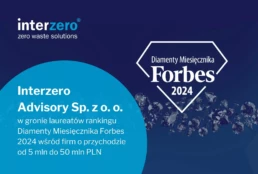
Interzero among the winners of Forbes Monthly Diamonds 2024!
We are pleased to announce that the ranking of Forbes Diamonds 2024: revenues from PLN 5 to 50 million The company of the Interzero Group in Poland - Interzero Advisory sp. z o. o. - was ranked 77th in the Mazowieckie Voivodship and 311th on the national list!
Forbes' Diamonds is one of the leading rankings among private companies operating in Poland, which aims to identify the most dynamic companies in a given region that have achieved the highest average annual growth in value. The ranking is based on the Swiss method of company valuation, which takes into account, among other things, financial results or asset values.
We would like to thank you for this prestigious award; it is proof of our continued growth and the result of the hard work of our employees, as well as an important indicator of our strengthening position in the market.
The full summary is available at the project's official website.
Could lack of waste become a problem? Statement by Anna Grom and Paweł Lesiak for the Dziennik Gazeta Prawna daily
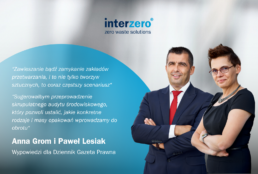
Could lack of waste become a problem? Statement by Anna Grom and Paweł Lesiak for the Dziennik Gazeta Prawna daily
Without effective recycling, we will not meet our obligations to close the recycling loop, with the threat of heavy fines. However, we can take action today instead of waiting idly for change.
On this subject in Dziennik Gazeta Prawna Interzero Board Representatives spoke: Anna Grom and Paweł Lesiak.
"The suspension or closure of treatment plants is an increasingly common scenario also in Germany or Italy, i.e. countries where the financial outlay for the collection, sorting, transport and treatment system has been for years, and still is, much higher than in Poland". - says Anna Grom.
"The situation has clearly got out of hand, as no one seems to have assumed that the EU would import recyclate en masse from the other side of the world, about whose composition and quality we know nothing. It is high time to restrict imports of untested and often falsely labelled secondary raw materials. This is because they displace better-quality but more expensive locally processed material from the market. Closing the borders in this way could be good for everyone." - says Paweł Lesiak.
"I would suggest conducting an up-to-date and meticulous environmental auditThis year's experience has shown that even large operators, due to the lack of reliable verification, can overstate the weight of packaging by up to 40 per cent. This year's experience has shown that even large entities, due to the lack of reliable verification, are able to overstate the weight of packaging by up to 40 per cent." - Paweł Lesiak adds.
We encourage you to read the entire material "When lack of waste becomes a problem - are we facing millions in fines?" at the link: HERE
26 January Interzero offices CLOSED
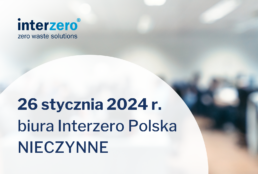
Interzero offices are closed on 26 January 2024.
Due to a resolution of the Boards of Directors of the Interzero Group companies in Poland, all Interzero offices will be closed on 26 January this year.
We will respond to any messages upon our return.
We apologise for any inconvenience.
Interzero Group mourns Markus Müller-Drexel
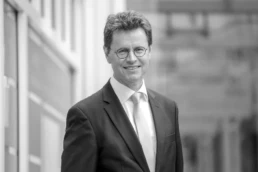
Interzero Group mourns Markus Müller-Drexel
The Interzero Group in Poland regrets the death of Markus Müller-Drexel, CEO of Interzero. We are all deeply saddened by the loss of this outstanding leader, associated with Interzero for almost 30 years.
For more information, see the press release in German: HERE
